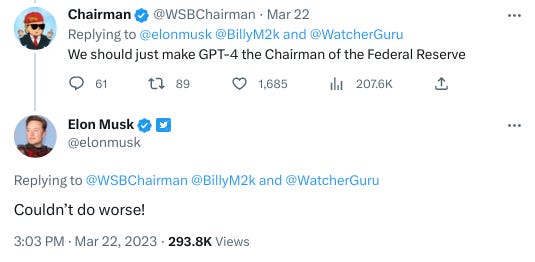What a time to be alive
Zoom layoffs, shuffle buttons, overpriced spandex, shiba inu, AI cocktails and existential crisis

Did Elon Musk change Twitter’s logo at the behest of an embattled meme stonker? What a time to be alive and (not!) using Twitter.
Last week1, Musk announced yet another wave of changes to the flailing social network, prioritizing the site’s small cadre of paid lackey accounts2 and picking fights with public media. In the melee, Musk also briefly changed Twitter’s logo from the long-time blue bird (on-brand, classic, literally tweets) to a doge (many crime3, much meme).
The idea seems to have originated during a March 2022 exchange between Musk and the anonymous blue-check4 @WSBChairman, whose consultative bona fides include 900,000 Twitter followers and … that’s it! The account is a vestige of the meme stock craze of 2021, when a well-timed fave from Elon Musk and a very public turf war with the moderators of r/WallStreetBets made its otherwise unremarkable owner an accidental spokesman for the movement.
This is the new Twitter ethos, though! Anti-elitist, ironic, volatile, random, questionably authoritative … it feels totally fitting that Musk takes cues from a meme stonk everyman. They’re just tittering their way to the moon. Or something like that.
P.S. Thanks to everyone who sent evidence of papal glamour after last week’s newsletter. The award for best submission goes to my dear friend Katie, who rightly called it “Young Pope erasure.”
P.P.S. No funny tweets this week, owing to ongoing drama between Twitter and Substack that prevents me from embedding them.
If you read anything this weekend
"What Does It Mean To Be a Boy Online in 2023?” by Henry Mance in The Financial Times Magazine. Boys act out to learn boundaries, but there are no boundaries on the internet. That’s made preteen boys a vulnerable audience for influencers peddling misogyny, violence, homophobia and other assorted ugliness. “Any group of 12-year-old boys anywhere in the world is likely to fall into scatological, borderline sexist, possibly homophobic chatter … The issue is when acting out to know how not to act becomes our permanent way of being.” (My italics)
“The Influencer Industry Is Having an Existential Crisis,” by Kaitlyn Tiffany in The Atlantic. What will become of the creator economy’s tenuous middle class — beloved by their followers (but not enough followers) and neglected by the platforms that made them (but that *they* helped make, as well)? A vague “culture shift” is purportedly in the works. And some are floating a union again.
“Lululemon Tried to Become a Tech Company. It Didn’t Work Out,” by Sebastian Leck in The Walrus. This feels like a particularly egregious example of an increasingly ubiquitous bait-and-switch: Companies that once sold discrete products you could buy and own forever (movies, dash cams, overpriced spandex) would now rather sell “services” you must pay to use (Netflix, car subscriptions … AR fitness classes).
“My Week With Chatgpt: Can It Make Me A Healthier, Happier, More Productive Person?” By Alex Hern in The Guardian. This is just one of many entries in the emerging genre of ChatGPT-takeover journalism, but it comes with a recipe for a weird, AI-generated cocktail that’s already worth the price of admission.
👉 ICYMI: The most-clicked link from last week’s newsletter was this visual essay on how everything looks the same now.
Thanks for being one of my 15,000 hypothetical Gchat friends.
Want to share your newsletter, podcast, job post or product with us? Click here to book a classified ad in the next edition.
Postscripts
Zoom layoffs are forever … as are pop-up ads. Literally just asked if some friends had snagged their one-year-old’s URL. Why all your friends are sending voice notes and what happens when AI invents scandals. How a U.S. TikTok ban would hurt global creators.
The psychologists treating trauma in the metaverse. The professor teaching virality. The meaning of midcentury food and a legal history of the 💩 emoji. Kendall Roy stans contain multitudes. Why AI art mishandles hands. “You would need to incorporate quantum physics for the shuffle button to be truly random.”
That’s it for this week! Until the next one. Warmest virtual regards.
— Caitlin
Full disclosure: I wrote most of this last week but only now got around to sending it. Time is a construct, don’t worry about it.
Only .2% of all active Twitter users have shelled out for Twitter Blue, which makes sense, because $8 a month is steep for a culture war status symbol. Unfortunately this means the accounts that should actually be verified are not.
An ongoing lawsuit — seeking $258 billion in damages — accuses Musk of deliberately inflating the price of Dogecoin (a nonexistent currency that no one should have paid real currency for) and then letting it crash.



